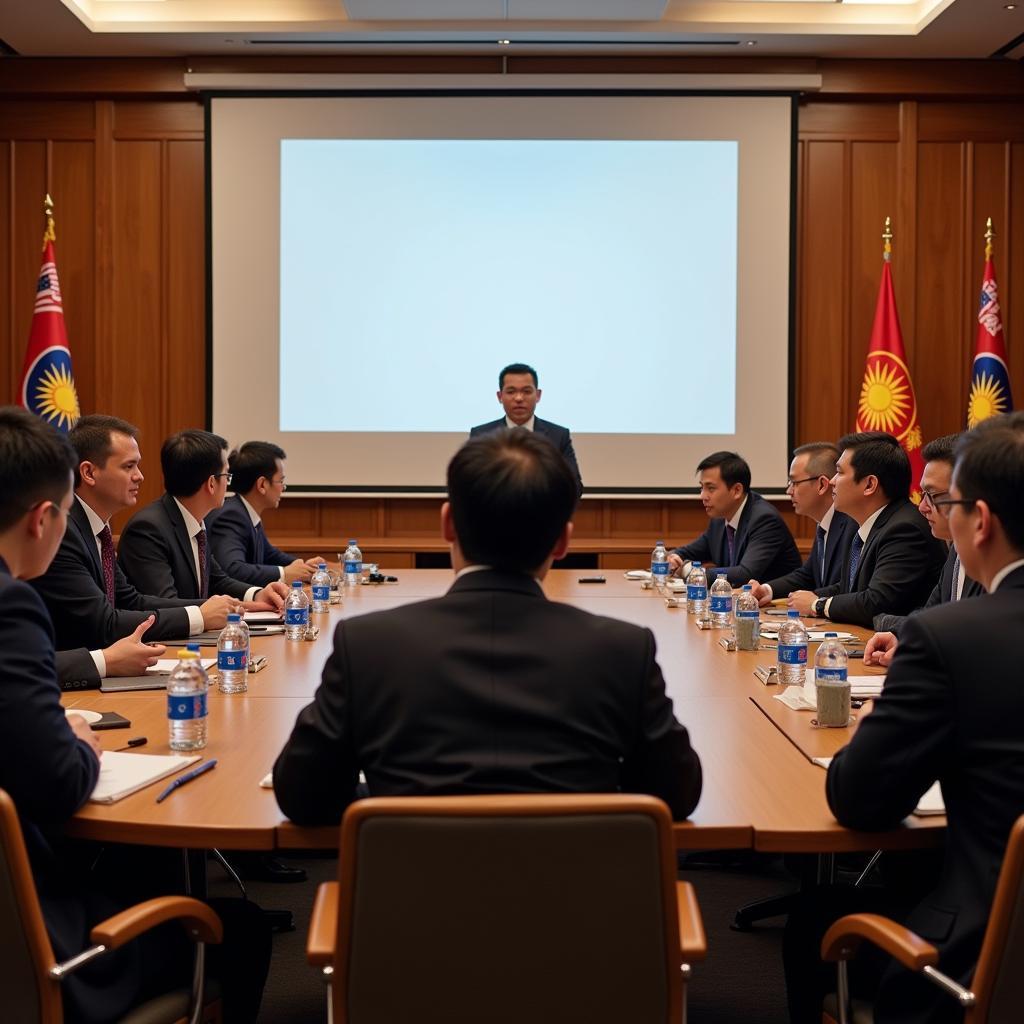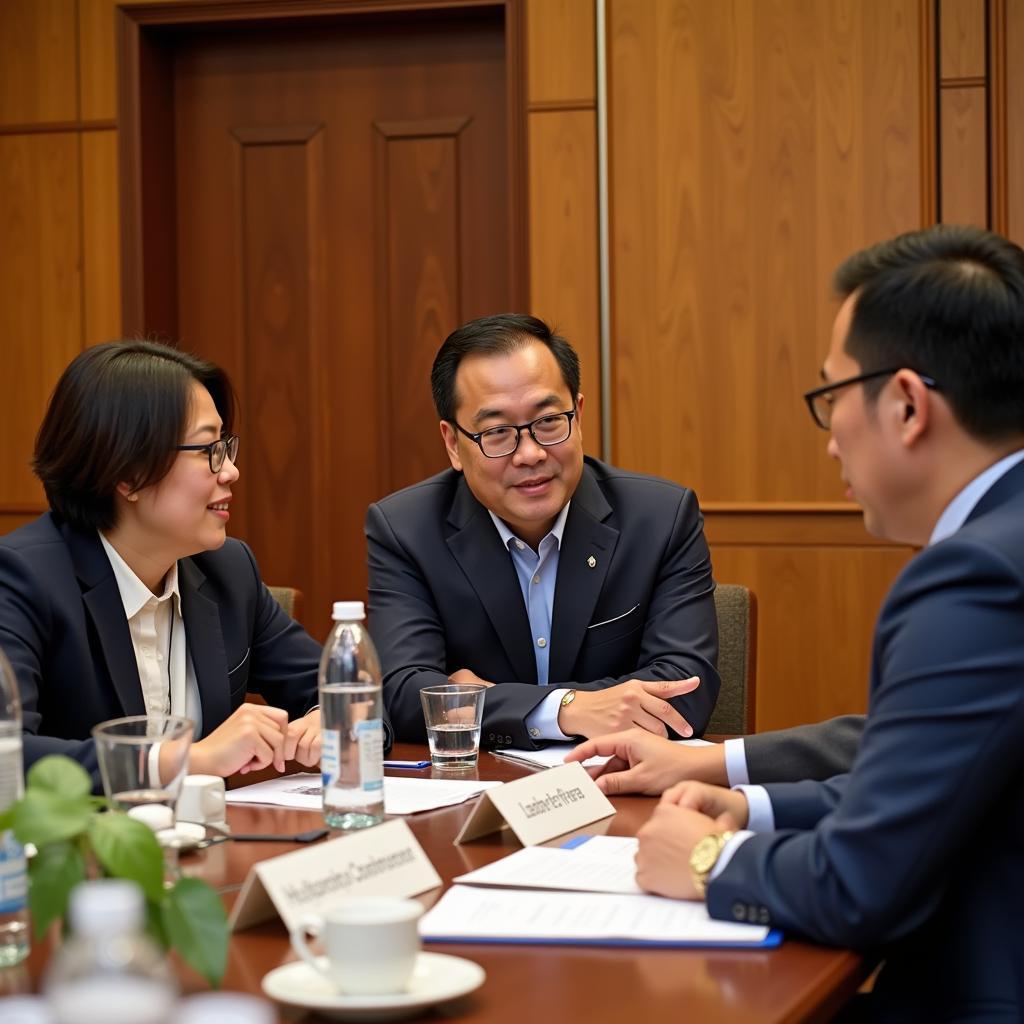The ASEAN facilitator plays a crucial role in fostering collaboration and driving progress within the diverse landscape of Southeast Asia. This role goes beyond mere coordination; it involves navigating complex political, economic, and social dynamics to achieve common goals and strengthen regional unity. Let’s delve into the intricacies of the ASEAN facilitator, exploring its functions, responsibilities, and impact on the region.  ASEAN Facilitator Meeting in Progress
ASEAN Facilitator Meeting in Progress
The Multifaceted Role of the ASEAN Facilitator
The ASEAN facilitator isn’t a static position; its responsibilities evolve depending on the specific context and the issue at hand. From mediating disputes between member states to coordinating disaster relief efforts, the facilitator wears many hats. A core aspect of this role involves bridging cultural differences and promoting mutual understanding. This requires a deep understanding of the region’s history, cultures, and political sensitivities. The facilitator acts as a neutral party, fostering open communication and encouraging consensus-building. For instance, the asean secretary general often plays a key role in facilitating regional dialogues.
Navigating Complexities: The ASEAN Facilitator in Action
One of the most demanding aspects of the facilitator role is managing conflicting interests between member states. ASEAN encompasses a diverse range of political systems, economic models, and social values. The facilitator must be adept at finding common ground and building bridges between these sometimes-divergent perspectives. This often involves delicate diplomacy, skillful negotiation, and a commitment to finding mutually acceptable solutions. Imagine trying to herd cats; that’s often what it feels like to navigate the complexities of ASEAN diplomacy. But, a skilled facilitator can bring even the most disparate voices together to achieve a common goal.
Key Responsibilities of an ASEAN Facilitator
- Building Consensus: The facilitator plays a central role in fostering consensus among member states on a wide range of issues.
- Mediation and Conflict Resolution: The facilitator helps resolve disputes and manage conflicts between member states, promoting peaceful solutions.
- Coordination and Collaboration: The facilitator ensures effective coordination and collaboration between different ASEAN bodies and stakeholders.
- Communication and Outreach: The facilitator communicates ASEAN’s positions and initiatives to the international community, fostering greater understanding and cooperation. The alamat kantor sekretariat asean jakarta serves as a hub for much of this communication.
The Impact of Effective Facilitation
Effective facilitation within ASEAN can lead to tangible outcomes, including increased regional stability, enhanced economic cooperation, and improved social development. When member states work together effectively, the whole region benefits. The facilitator is the catalyst that makes this cooperation possible. “A strong facilitator is the backbone of ASEAN’s success,” says Dr. Anya Sharma, a prominent expert on Southeast Asian politics. “They are the glue that holds this diverse region together.”
 ASEAN Facilitator Promoting Collaboration
ASEAN Facilitator Promoting Collaboration
Challenges and Opportunities for the ASEAN Facilitator
The ASEAN facilitator faces numerous challenges, including navigating complex geopolitical dynamics, managing diverse interests, and responding to evolving regional and global challenges. However, these challenges also present opportunities for innovation and leadership. By embracing new approaches and fostering stronger partnerships, the facilitator can further enhance ASEAN’s effectiveness and relevance in the 21st century. For instance, platforms like ase moderators uk offer new opportunities for dialogue and collaboration.
Conclusion
The ASEAN facilitator plays a vital role in driving progress and fostering unity within the region. By navigating complex political landscapes and promoting collaboration, the facilitator helps ASEAN achieve its shared goals and strengthen its position on the global stage. The future of ASEAN depends on the continued effectiveness of its facilitators, ensuring that this dynamic region continues to thrive. This crucial role needs individuals with strong diplomatic skills, a deep understanding of the region, and a commitment to ASEAN’s shared values. abigail asean secretariat provides a good example of the expertise needed in this role. The continued success of ASEAN relies heavily on the Ase Facilitator’s ability to navigate complex issues and promote collaborative solutions.
FAQ
- What are the key qualities of an effective ASEAN facilitator?
- How is the ASEAN facilitator selected?
- What are some examples of successful ASEAN facilitation?
- What are the main challenges faced by ASEAN facilitators?
- How can the role of the ASEAN facilitator be strengthened in the future?
For any support, please contact us at Phone Number: 0369020373, Email: aseanmediadirectory@gmail.com or visit our address: Ngoc Lien Village, Hiep Hoa, Bac Giang, Vietnam. Our customer service team is available 24/7.
